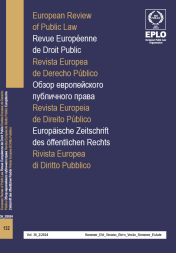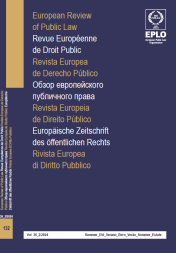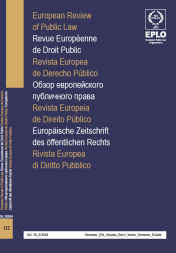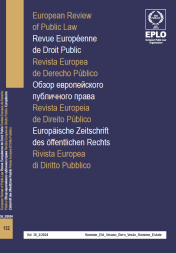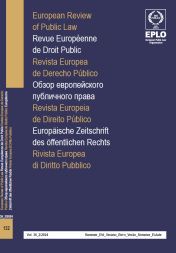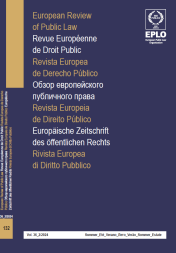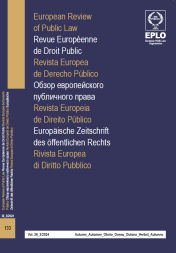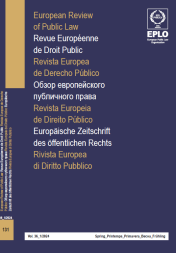
ERPL, vol. 36, no 2, summer/été 2024 (132)
This ERPL issue features papers on topical matters covering legal issues of special interest and a plethora of jurisdictions, faithful to the ERPL’s scope and aims.
- Summary
Articles
G. Amato, Global Law and the Black Holes (that Would Like to Gobble It Up) [IN ENGLISH] (18 pp.)
A. Mudrecki / M. Augustyniak, La vaccination contre la Covid-19 obligatoire à la lumière du principe de proportionnalité - Quelques réflexions [IN FRENCH] (20 pp.)
M.-J. Garot, The Digital Services Act and the Search for Certainty (Risk Assessment, Risk Mitigation and the European Commission) [IN ENGLISH] (33 pp.)
Chronicles
I. Constitutional Law / Droit constitutionnel
I. N. Robl Filho, Brazil / Brésil [IN PORTUGUESE] (30 pp.)
J. Pina-Delgado / L. Tiujo-Delgado, Cabo Verde [IN PORTUGUESE] (44 pp.)
I. Kalandadze, Georgia / Géorgie [IN ENGLISH] (17 pp.)
A. Nikolić, Serbia / Serbie [IN ENGLISH] (29 pp.)II. Administrative Law / Droit administratif
C. Vinícius Alves Ribeiro, Brazil / Brésil [IN ENGLISH] (8 pp.)
L. Tiujo-Delgado / J. Pina-Delgado, Cabo Verde [IN PORTUGUESE] (38 pp.)
V. Laugier, France [IN FRENCH] (21 pp.)
L. Mustert / O. Al Khatib / R. Widdershoven / M. van Zanten, The Netherlands / Pays-Bas [IN ENGLISH] (38 pp.)III. Jurisprudence
M. Heitzmann-Patin / M.-O. Peyroux-Sissoko, Constitutional Jurisprudence / Jurisprudence constitutionnelle, France [IN FRENCH] (42 pp.)
Books Received [IN ENGLISH] (4 pp.)
- Editorial
The ERPL is honored to publish in this issue an article by Giuliano Amato, Professor Emeritus at the EUI in Florence and at the University La Sapienza in Rome, Member of Parliament, Minister and twice Prime Minister of Italy, former Vice President of the Convention on the future of Europe and Justice and President of the Italian Constitutional Court, currently serving as Chairman of the Global Rule of Law Commission of the EPLO (European Public Law Organization).
In this article, the author posits that globalization has spawned a global legal space increasingly filled with regulations, decisions, and transactions coming from a multiplicity of sources: governments, public international organizations and even private organizations. A first black hole lies in that in military conflicts civilians’ and prisoners’ rights are increasingly violated, while the UN is almost powerless. A second black hole lies in the clauses of international charters and conventions regarding the rights of women and children, which, deprived as they are of effective safeguards, are fast disappearing. As the context of international politics is key in understanding what happened and searching for possible solutions, the paper analyzes and makes concrete proposals in order to meet the urgent need to salvage multilateralism and to put it back on its feet, endowing it with the minimum amount of authority required to make compliance with it appear justified.
The article was first published as “Giuliano Amato, Global law and the black holes (that would like to gobble it up)”, in: Jean Monnet Working Paper 1/24, 2024, and is available at The Jean Monnet Center for International and Regional Economic Law & Justice website (https://jeanmonnetprogram.org/paper/global-law-and-the-black-holes-that-would-like-to-gobble-it-up/). It is published in the European Review of Public Law (ERPL) with permission by the author, who holds the Copyright for this paper.
The second article examines the possibility of introducing, as a solution to the danger of not reaching herd immunity, compulsory vaccination against Covid-19 in terms of respect for human rights in the Polish legal system. In this context, is carried out an analysis of the case law of the Supreme Administrative Court of Poland, of the European Court of Human Rights in Strasbourg, as well as of the legal provisions in the EU law and in the Polish Constitution. By using the dogmatic-legal method, the authors maintain that, when there is a conflict in the application of the correct interpretation of the law, it can be useful to use the principle of proportionality as a normative, jurisprudential and doctrinal principle at the same time.
The Digital Services Act (DSA) entered into force in February 2024 and imposed new due diligence obligations to very large online platforms (VLOPs), such as Facebook, YouTube or X to name but a few. It is in this context that the third article aims to assess the effectiveness of the newly introduced due diligence obligations on risk assessment and mitigation for VLOPs and the enhanced enforcement role given to the European Commission in this regard.
In the section of Chronicles of Constitutional Law, the first chronicle coming from Brazil analyzes four main thematic axes: 1) the acts of the coup plotters on January 8, 2023 with the invasion of headquarters of the three Powers in Brasília – Federal District and the criminal consequences in Federal Supreme Court judgments, as well as the ineligibility of the former President of the Republic and candidate defeated in the 2022 elections by the Superior Electoral Court, 2) the constitutional reforms produced by Constitutional Amendments nº. 129, nº. 130, nº. 131 and nº. 132, giving emphasis to the Tax Reform, which substantially changed the constitutional tax system, 3) the relevant changes in the composition of the Federal Supreme Court, due to two retirements and, consequently, the appointments of two new Judges and 4) the discussions in the precedents of the Superior Electoral Court, regarding freedom of speech, in the context of democratic erosion in the 2022 elections, and the great litigation over workers’ rights and economic freedom in the decisions of Labor Judges and Courts and the Federal Supreme Court.
The next chronicle, on the Constitutional Law of Cabo Verde, points out that the year 2023 was marked by the enactment of legislation on core matters, namely the amendments of the Criminal Code, the Labor Code, the Tax Procedure Code and the Aliens Act; the approval of a Code of Administrative Procedure, a Public Employment Act and the new Nationality Act. It was also the year in which disputes between the Cabinet and the President of the Republic intensified; in 2023, for the first time, the Constitutional Court recognized a custom derogating the constitutional text – a decision that sparked heated debate and controversy, almost causing a constitutional crisis. Finally, this was the year the Court rendered an unprecedented number of decisions.
The third Constitutional Law chronicle analyzes the developments regarding anti-money laundering legislation in Georgia. Georgia, as a member of the international community, has implemented robust anti-money laundering measures both at the level of state institutions and the financial sector to combat money laundering and adhere to international standards. In this regard, Georgia has made significant progress in recent years. This was manifested both in bringing the legislative framework into compliance with international standards as well as in strengthening state institutions and introducing effective control mechanisms in the financial sector.
The fourth Constitutional Law chronicle, coming from Serbia, briefly presents the constitutional developments in the Republic of Serbia for the year 2023, i.e., the events that have shaped it. First and foremost, it addresses the post festum of judicial reform and the laws that accompanied the previous partial constitutional amendment. Finally, it focuses on the analysis of the extraordinary parliamentary, provincial, and local elections held in December 2023.
The first Administrative Law chronicle in this ERPL issue examines the risks to democracy in Brazil during the “Bolsonaro Era” and highlights the importance of popular participation as an antidote. It traces Brazil’s democratic journey from the end of authoritarian rule in 1985 to the election of Jair Bolsonaro in 2018, analyzing factors that led to citizen disillusionment and vulnerability. The article emphasizes the crucial role of genuine citizen participation in safeguarding democratic principles and fostering a sense of inclusion and concludes by stressing the need for meaningful participation of marginalized groups, institutional accountability, and a shared commitment to civic affairs to strengthen democracy and prevent a slide towards apathy and tyranny.
The second Administrative Law chronicle emphasizes the great dynamic on administrative law matters in Cabo Verde in the year 2023; besides minor legal acts, the Cabinet, authorized by the Parliament, approved the first Code of Administrative Procedure of Cabo Verde, aimed at introducing, from a formal and material viewpoint, a new paradigm. The National Assembly enacted the Public Employment Act with the purpose of regulating more accurately and through new solutions the employment relationship between a person and the public administration. Finally, the contributions in the field of Administrative Law resulting from decisions adopted by the constitutional jurisdiction and the administrative jurisdiction are listed and discussed.
The chronicle on the Administrative Law of France outlines how, in 2023, the dynamism of French Administrative Law depends less on the developments of its rules by administrative jurisprudence – which is relatively stable – than on the role held by these rules in the response of public authorities to major societal challenges. While these challenges are not specific to France, their resolution on the basis of considerations drawn from the national context resulted in responses claiming a degree of specificity, to the point that we regularly speak of “French models”. Recent case law, legislation and doctrine on the subject are thus particularly rich concerning certain public policies, such as the reception of foreigners, public safety, the place of religions in the public sphere, the fight against global warming or the end of life.
Last but not least, the chronicle on Dutch Administrative Law follows; according to the authors, the past five years have been a turbulent period, mainly due to the childcare benefit scandal. The Dutch legislator and the administrative courts have reflected on their respective roles in the scandal, resulting in a commitment to placing the citizen’s perspective back at the forefront of administrative law. In line with this commitment, they have taken measures – discussed in detail in this chronicle – strengthening the protective function of general principles of good administration and improving judicial protection against the administration. In this regard special attention is paid to the challenges posed by the increasing digitalization of the administration.
Going on to the section of Jurisprudence, the chronicle on French Constitutional Jurisprudence analyzes the decisions of the Constitutional Council issued in 2023. This year has been particularly marked by political events that had an impact on the Constitutional Council, such as the pension reform which placed it almost at the heart of the political debate. The constitutional jurisdiction has also had to rule, in this year 2023, on the “Fillon case” and on a PCQ (QPC) related to the storage of radioactive waste, a proof as if this was necessary that the Council is seized of issues as diverse as they are central to French society. The year has moreover allowed the Council on several occasions to apply its recent Rules of Procedure framing the a priori control of legislation (dating from 2022).
This ERPL issue is concluded by the presentation of four books received by the EPLO Library.















